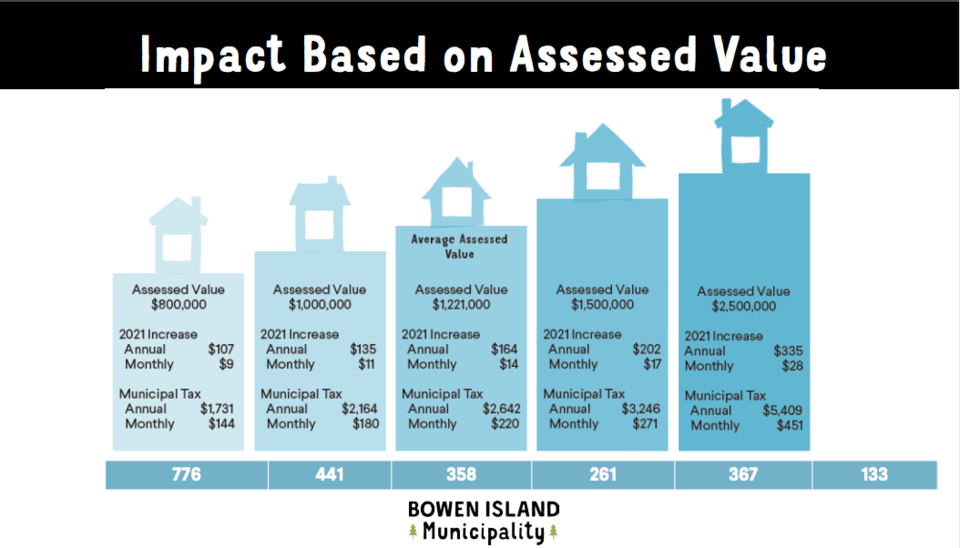Bowen Island's municipal property taxes will rise 6.6 per cent this year as Bowen Island Municipality seeks an additional $379,200 in 2021. (This is very nearly the same amount proposed to council and that the Undercurrent reported in December.)
This rise does not include the water and sewer systems' parcel taxes (all of which will see tax rises of between 10 and 20 per cent this year - story to come).
The average home, valued at $1.2 million, will pay an additional $164 per year, said staff at the Feb. 11 regular council meeting. Chief financial officer Raj Hayre made the point that two-thirds of island homes are valued under that average.
 . By Bowen Island Municipality
. By Bowen Island Municipality
Council passed first, second and third readings of the five-year financial plan (budget) Monday evening. After this budget is adopted (presumably at the next council meeting) BIM staff will bring the accompanying taxation bylaws to council.
The tax increase breaks down as follows:
- A 2 per cent increase ($114,200) for capital renewal and replacement (this money gets put aside for infrastructure needs);
- A 2 per cent increase ($114,000) for services and supplies due to inflation;
- A 1.8 per cent increase ($102,100) for BIM staff due to inflation in cost of living (a raise that wasn’t applied in 2020);
- A 0.9 per cent increase ($54,000) for more staffing;
- A 0.9 per cent increase ($50,000) for council strategic initiatives.
However, new construction revenue, homes added to the tax role, will cover about 1 per cent ($55,000) of the above increases, said a staff report.
Hayre described the budget as covering the “bare bone needs of the municipality.”
Hayre pointed to the difference between this and the first draft of the budget, which would’ve seen an 8.6 per cent increase for staffing alone, to, as he put it, “Sustainably deliver the level of service as expected or for the most part currently being provided.”
Hayre cautioned that staff are strained trying to maintain current service levels. He described municipality staff working long, un-budgeted hours. “This is not sustainable in the long run,” said Hayre. “People are going to burn out. We’re going to end up losing staff to other places if we don’t have the resources to do the job we want to do – need to do.”
The 2021 budget is also seeing the weight of infrastructure projects – those already under way and those needed – with a $3.8 capital budget for 2021.
While no councillor jumped with glee at raising taxes 6.6 per cent, there was general consensus that this was a needed rise.
“I like that we have everything on the table,” said Mayor Gary Ander. “We’ve certainly uncovered a lot of issues on the island that need to be attended to and unfortunately, we have to deal with them at this time.”
Coun. Michael Kaile defended the staffing levels increase. “Because people love to throw eggs at us on how many staff we have,” he said. “This is to get the right people in our organization doing the right things.”
Pointing to the money coming in from grants and the work produced by municipal staff, Kaile said that BIM staff are working “valiantly.”
“We don’t have some grisly bloat of people doing nothing and wasting our taxpayers’ money,” said Kaile. “And I think that’s hugely, hugely significant.”
Though noting his discomfort with the level of resources allocated to a new fire truck and fire hall, Coun. Rob Wynen also grudgingly supported the budget. “I just want to recognize that it is a significant increase,” said Wynen, sharing that his own tax increase will come out to the equivalent of an extra day’s work for him.
Coun. Alison Morse was the lone vote against passing the five-year plan. She later said she questioned how much BIM is putting into reserves “because it isn’t enough” and that she wanted more discussion about the budget generally and the trade-offs.



